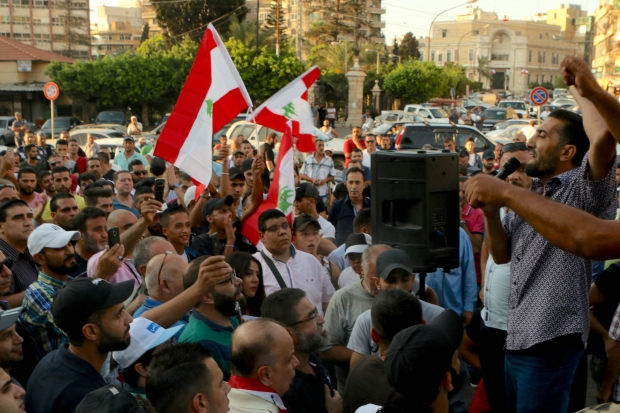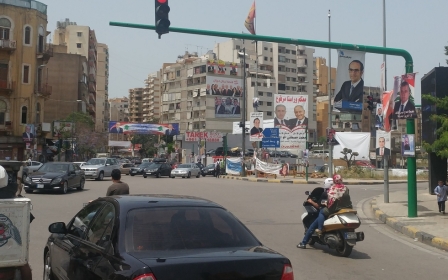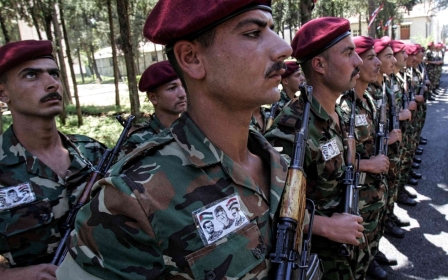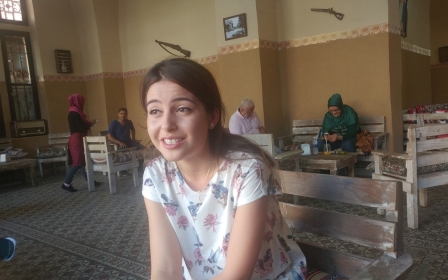Protesters in north Lebanon want Tripoli development to help poor
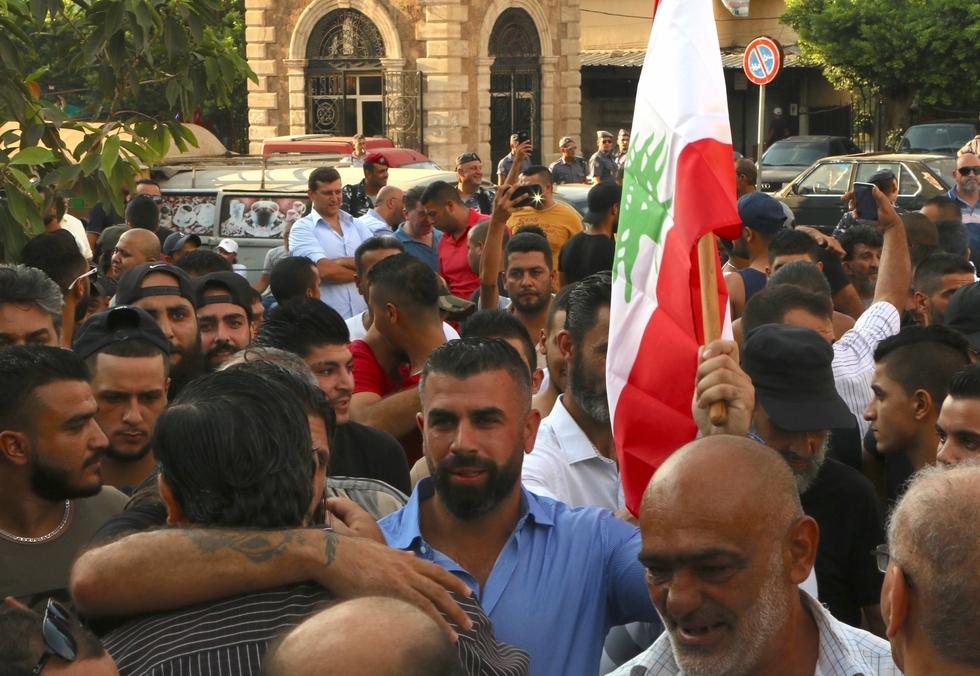
BEIRUT - There's a new protest movement in Lebanon's Tripoli, and its demands are simple: an end to corruption and poverty, access to clean water and health insurance, and electricity for at least 20 hours a day.
"The Revolution of the Destitute," as the demonstrators have called it, has gathered in the northern Lebanese city since late August - with the largest protest thus far on 26 August, drawing a crowd of at least 200 people.
Many of those gathered in al-Tal Square, in the heart of Tripoli, were there for personal reasons, like a young man named Ibrahim.
"I have one daughter," he told Middle East Eye. "When she was in the hospital, they said, 'We want 15 million [Lebanese lira, or $9,900].' I barely have 1,000 LL. I don't have 15 million. What do you want me to do?"
The demonstrations have been led by activist Rabih al-Zein, who arrived at the 26 August protest to an eruption of cheers from the crowd.
In the lead-up to the rallies, Zein had released a statement condemning the political class, and said that the movement's participants "are not demanding impossible things, we have the right to get at least 20 hours of electricity".
Zein and his movement have arisen at an important time for Tripoli and north Lebanon. Over the past few months, the Lebanese government has been making headway on a set of development plans for Tripoli and Lebanon's north in hopes of transforming the area from one of the country's poorest regions into an international trade and logistics hub.
While many are cautiously optimistic about the benefits these plans could bring, local politicians, community leaders and activists, like those at last Sunday's rally, remain skeptical about the political will to implement them, and distrust in government promises runs deep in Tripoli.
Hariri's seven-point plan
The wide-ranging plans are part of a seven-pillar initiative which was laid out by Lebanese Prime Minister Saad al-Hariri during an address in Tripoli in April.
The plans, according to Lebanese state media, include the expansion of the port of Tripoli, the construction of an adjacent special economic zone, the rehabilitation of Tripoli's old airport, and the reconstruction of a railroad connecting Tripoli to the border with Syria.
Preparations for some of these projects have been underway for years - according to Lebanon’s High Council for Privatisation and PPP (HCP), the special economic zone was established by law in 2008 - but many of them have only recently secured much-needed funding.
State media reported that the country had received $3bn in investments for infrastructure development in the north at the CEDRE investment conference in Paris this past April, and, according to The Daily Star, Chinese companies are reportedly looking to finalise their own investments in the region soon as well.
We are truly the second capital [of Lebanon], but by God, we are living below the poverty line!
- Tripoli demonstrator
Some of these planned developments have already borne fruit - completed expansions of Tripoli's port have allowed larger container vessels to dock in the city, and in August the port received the largest ship in its history, The Daily Star reported.
Abdul Ghani Kabbara, Hariri's adviser for north Lebanese affairs, told Middle East Eye that these plans were part of a long-term strategy by the government in Beirut to rehabilitate Tripoli after the many rounds of sectarian clashes that shook the city for years before 2014.
"After stability, you start asking about the economy, and you start asking about how the government can support the people really, [to] regain what they lost through the past years due to the conflicts," he said.
But at al-Tal Square, demonstrators made clear they had grown impatient after years of neglect by Lebanon's central government. One speaker quoted a phrase uttered by politicians touting the development plans.
"'The special economic zone is important to the second capital of Lebanon'," he said on stage. "We are truly the second capital [of Lebanon], but by God, we are living below the poverty line."
Solving Tripoli's joblessness
Tripoli is one of Lebanon's poorest major cities. A 2015 UN study found that 57 percent of its residents are "deprived" with regards to economic status, healthcare and other services, while 26 percent are "extremely deprived". Furthermore, the World Bank reported in 2017 that 53 percent of working-age people in north Lebanon were unemployed.
Raya al-Hassan, the chairwoman and general manager of the special economic zone, is confident the zone will do much to alleviate these immense strains.
Hassan told Middle East Eye that the zone alone would create up to 7,000 direct and indirect jobs, including both skilled and unskilled positions.
"The potential that this place has, has not been tapped until today," she said. "Now, Lebanese are coming in droves, you have a lot of international development agencies coming to see what could be done."
But Bassel el-Hajj, a member of the municipality of Tripoli and the head of the Committee of Public Development in the city, is not as hopeful.
We are not demanding impossible things; we have the right to get at least 20 hours of electricity
- Rabih al-Zein, Tripoli activist
"What I see, the problem in the north, for the poor people, how you can help them?" he told Middle East Eye. "It's not like this. You have to create something that fits these people."
Hajj is well-connected with leaders in some of Tripoli's poorest neighbourhoods and has worked for years with NGOs active in these areas.
"The projects coming to the north are good," he said. "But how to implement them, and from where to take people ... to embed them in this project, this is the problem."
Implementation challenges
The Lebanon branch of Ruwwad al-Tanmeya is one of the many NGOs Hajj has worked with. The organisation is based in the Bab al-Tabbaneh and Jabal Mohsen neighbourhoods, which were the epicentre of Tripoli's sectarian battles years ago.
Among its various activities, the group grants scholarships, gives business training and supports local youths as they work toward employment or higher education opportunities.
Sarah al-Charif has served as the group's director in Lebanon since the branch's foundation in 2012. She told Middle East Eye that Ruwwad has been working with the special economic zone to ensure that youths taking part in the organisation's programmes are prepared for the jobs that will eventually be offered.
She said she is not worried that the new economic plans could have positive effects. Rather, she has other concerns that are similar to Hajj's.
"I think people ... feel that it's a joke that is being told, and they cannot accept that it's a reality until they really see things are happening and things are being implemented," she said.
In addition to potential problems with funding, Charif noted that Lebanon's often inefficient government may also present a significant obstacle to the plans' completion.
"Whenever you're working with ministries or governments ... the more bureaucracy you have, the less productivity you will have, and the less hope you will have to continue," she said.
Hassan claims that such concerns are unfounded.
This special economic zone will create jobs, but it is not the cure to all the wounds of the city
- Raya al-Hassan, chairwoman and general manager of the Tripoli Special Economic Zone
"In the special economic zone, we have our own special law, so that we are not affected by the same bureaucracy that affects Lebanon as a whole," she told Middle East Eye.
Hassan stated that this law gives the zone the ability to grant contracts and licences on its own without outside interference.
She also underlined the fact that the financing for the zone, some of which came from a soft loan given to Lebanon by the World Bank, will not be overseen by the government at all, diminishing the potential for corruption.
"We're hoping to make an example out of the Tripoli economic zone in terms of good governance," she said.
A beginning
Nevertheless, other projects that are part of the development plans have not been able to proceed as smoothly. Last year, Lebanon's public works and transport minister pledged that pilgrims on Hajj would be able to fly out of Tripoli's international airport in 2018, according to The Daily Star.
This year’s Hajj season has come and gone, and yet the airport remains abandoned.
We are not against any one party, not against any fight, we are against corrupt politicians
Rabih al-Zein, Tripoli activist
In response to concerns about corruption and the lack of basic services that "The Revolution of the Destitute" are protesting against, Hassan said people should not see the development plans as a solution for everything.
"This special economic zone will create jobs, but it is not the cure to all the wounds of the city," she said.
Kabbara went even further.
"It's not enough to be called a beginning," he said of the development plans. "We have to really give the opportunity for the new generation to succeed somewhere; this becomes a start, a beginning."
Despite his misgivings about Lebanon’s political establishment, Zein, the leading activist of the Tripoli protests, said he was encouraged by the promised benefits of the new economic developments. After all, he said, his concerns are much broader.
"We are not against any one party, not against any fight, we are against corrupt politicians," he said. "We are with anyone who will bring improvements to the city."
New MEE newsletter: Jerusalem Dispatch
Sign up to get the latest insights and analysis on Israel-Palestine, alongside Turkey Unpacked and other MEE newsletters
Middle East Eye delivers independent and unrivalled coverage and analysis of the Middle East, North Africa and beyond. To learn more about republishing this content and the associated fees, please fill out this form. More about MEE can be found here.


